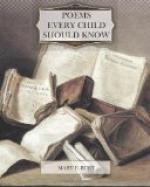A maiden knight—to
me is given
Such hope, I know
not fear;
I yearn to breathe the airs
of heaven
That often meet
me here.
I muse on joy that will not
cease,
Pure spaces cloth’d
in living beams,
Pure lilies of eternal peace,
Whose odours haunt
my dreams;
And, stricken by an angel’s
hand,
This mortal armour
that I wear,
This weight and size, this
heart and eyes,
Are touch’d,
are turn’d to finest air.
The clouds are broken in the
sky,
And thro’
the mountain-walls
A rolling organ-harmony
Swells up, and
shakes and falls.
Then move the trees, the copses
nod,
Wings flutter,
voices hover clear:
“O just and faithful knight
of God!
Ride on! the prize
is near.”
So pass I hostel, hall, and
grange;
By bridge and
ford, by park and pale,
All-arm’d I ride, whate’er
betide,
Until I find the
holy Grail.
ALFRED TENNYSON.
A NAME IN THE SAND.
“A Name in the Sand,” by Hannah Flagg Gould (1789-1865), is a poem to correct our ready overestimate of our own importance.
Alone I walked the ocean strand;
A pearly shell was in my hand:
I stooped and wrote upon the
sand
My name—the
year—the day.
As onward from the spot I
passed,
One lingering look behind
I cast;
A wave came rolling high and
fast,
And washed my
lines away.
And so, methought, ’twill
shortly be
With every mark on earth from
me:
A wave of dark oblivion’s
sea
Will sweep across
the place
Where I have trod the sandy
shore
Of time, and been, to be no
more,
Of me—my day—the
name I bore,
To leave nor track
nor trace.
And yet, with Him who counts
the sands
And holds the waters in His
hands,
I know a lasting record stands
Inscribed against
my name,
Of all this mortal part has
wrought,
Of all this thinking soul
has thought,
And from these fleeting moments
caught
For glory or for
shame.
HANNAH FLAGG GOULD.
[Illustration]
PART VI.
“Grow
old along with me!
The
best is yet to be,—
The last of life, for which
the first was made.”
THE VOICE OF SPRING.
“The Voice of Spring,” by Felicia Hemans (1749-1835), becomes attractive as years go on. The line in this poem that captivated my youthful fancy was:
“The larch has hung all his tassels forth,”




